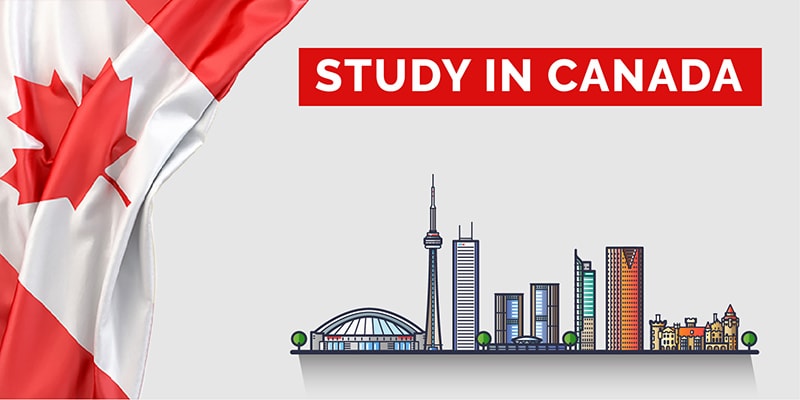Study in Canada: Your Complete Guide to Studying Abroad
Canada has long been one of the top destinations for international students, offering high-quality education, a diverse culture, and a high standard of living. Whether you’re considering undergraduate studies, post-graduate programs, or language courses, Canada offers a range of educational opportunities that cater to all academic interests.
In this article, we’ll guide you through the process of studying in Canada, from selecting the right program and university to understanding the application and visa process.

Why Study in Canada?
Canada is widely regarded as a premier study destination, and for good reason. Here are some key advantages to studying in Canada:
-
Top-Ranked Universities: Canada is home to several world-class universities, such as the University of Toronto, McGill University, and University of British Columbia. These institutions offer diverse academic programs and are known for their research excellence and high graduate employability rates.
-
Affordable Tuition Fees: Compared to other countries like the United States or the United Kingdom, Canada offers relatively affordable tuition fees. International students can expect to pay between CAD 7,000 and CAD 29,000 per year, depending on the program and institution.
-
Diverse and Inclusive Environment: With over 200,000 international students studying in Canada, the country is one of the most multicultural places in the world. This makes it easy for students to adapt and connect with peers from various backgrounds.
-
Post-Graduation Work Opportunities: Canada offers various work permits for students after graduation, such as the Post-Graduation Work Permit (PGWP), which allows you to work in Canada for up to three years after completing your program.
-
Safety and Quality of Life: Canada is consistently ranked among the safest countries in the world. It boasts a high quality of life, with excellent healthcare, a clean environment, and friendly, welcoming citizens.
How to Choose the Right University in Canada
Choosing the right university is an important decision that can shape your academic journey. Here’s how to make an informed choice:
1. Research Programs and Majors
Before selecting a university, identify the program or field of study you’re passionate about. Canada offers a wide range of programs, from business and engineering to healthcare and artificial intelligence. Research universities that offer strong programs in your field of interest.
Top universities like the University of Toronto and McGill University are renowned for their engineering and business programs, while University of British Columbia is famous for its environmental studies and marine biology programs.
2. Location and Campus Life
Consider the location of your university. Canada’s cities vary in climate, cost of living, and lifestyle. Cities like Toronto and Vancouver are bustling with activity and job opportunities, while cities like Quebec City or Ottawa offer a more relaxed pace and rich cultural heritage.
Furthermore, think about the campus facilities, student support services, and extracurricular activities available. Universities in Canada are known for their strong student communities, so find one that matches your interests and needs.
3. University Rankings and Reputation
University rankings can help you gauge the quality of education and reputation of the institution. Rankings like QS World University Rankings and Times Higher Education provide valuable insights. Canadian universities like University of Toronto, McGill University, and University of Alberta consistently rank among the top in global lists.
4. International Student Support Services
Canada is known for its welcoming environment, and most universities offer extensive support to international students. Services include language support, counseling, career guidance, and cultural integration programs. Check for universities that provide strong international student support to ease your transition.
Application Process for Studying in Canada
The application process for studying in Canada varies by institution and program. However, the general steps include:
1. Choose Your Program
The first step is to choose a program that aligns with your academic goals. Make sure the program is offered by a Designated Learning Institution (DLI), which is an institution that is approved by the Canadian government to host international students.
2. Prepare Application Documents
Typically, you will need to provide the following documents:
-
Academic transcripts
-
Proof of English language proficiency (e.g., IELTS, TOEFL)
-
Statement of purpose
-
Letters of recommendation
-
Proof of financial ability to cover tuition fees and living expenses
3. Submit Your Application
Most Canadian universities accept online applications through their respective portals. Be sure to check the application deadlines and submit your materials well in advance.
4. Receive Your Offer Letter
If accepted, you’ll receive an offer letter from the university. This letter is required to apply for your student visa and to make travel arrangements.
Understanding Canadian Student Visas
To study in Canada, you will need a study permit (student visa). Here’s what you need to know about the process:
1. Eligibility for a Study Permit
To be eligible for a study permit, you must meet the following requirements:
-
Be accepted by a Designated Learning Institution (DLI) in Canada.
-
Prove you have enough funds to pay for tuition, living expenses, and return travel.
-
Provide a police certificate and medical exam results if requested.
-
Demonstrate your intent to leave Canada upon completing your studies.
2. Applying for a Study Permit
You can apply for a study permit online through the Immigration, Refugees and Citizenship Canada (IRCC) website. The process typically requires you to submit documents such as:
-
Your university offer letter
-
Proof of financial support
-
Passport-sized photographs
-
Valid passport
3. Processing Time and Fee
The processing time for a study permit may vary, but it typically takes around 3 to 4 weeks. The application fee is about CAD 150. Be sure to apply well in advance of your program start date.
4. Work While Studying
With a student visa, you are allowed to work up to 20 hours per week during the semester and full-time during scheduled breaks. This is a great way to gain Canadian work experience and support your living expenses.
Cost of Studying in Canada
The cost of studying in Canada depends on various factors, including the program, university, and city. Here’s a breakdown of the costs you can expect:
1. Tuition Fees
Tuition fees for international students in Canada range from CAD 7,000 to CAD 29,000 per year. Programs like medicine and engineering are on the higher end of the scale, while humanities programs tend to be more affordable.
2. Living Expenses
Living expenses vary by location. Major cities like Toronto, Vancouver, and Montreal have higher costs of living, with monthly expenses ranging from CAD 1,000 to CAD 1,500. Smaller towns and cities are generally more affordable, with monthly living costs around CAD 800 to CAD 1,200.
3. Scholarships and Financial Aid
There are numerous scholarships available to international students, both from Canadian universities and government programs. For example, the Vanier Canada Graduate Scholarships and Canadian Commonwealth Scholarship Program offer funding for students pursuing graduate studies.
What to Expect While Studying in Canada
Life in Canada as an international student is a mix of academic challenges, personal growth, and cultural experiences. Here’s what you can expect:
1. Accommodation Options
Students in Canada can choose between on-campus housing, off-campus apartments, and homestays. Many universities offer on-campus dormitories, which provide a social environment and proximity to classes.
Off-campus housing is available in most cities, but prices can vary. Renting an apartment or sharing with others is an option for students who prefer more independence.
2. Health Insurance
International students are required to have health insurance in Canada. Many provinces provide coverage for students through government-sponsored health plans, but if you’re studying in Quebec, you might need to purchase private health insurance.
3. Student Life and Activities
Canadian universities offer a rich student life, with plenty of clubs, societies, and sports teams to join. Whether you’re interested in sports, arts, volunteering, or student government, there’s something for everyone. Be sure to take part in orientation events to meet fellow students and learn more about campus life.
4. Employment Opportunities
Canada allows international students to work on or off-campus while studying. Many students take part-time jobs in retail, hospitality, or on-campus roles, which helps gain work experience and meet new people.
Frequently Asked Questions (FAQs)
1. Can I work while studying in Canada?
Yes, international students in Canada can work up to 20 hours per week during the academic year and full-time during breaks. Working while studying can help you gain Canadian work experience and offset living costs.
2. What is the cost of living in Canada for international students?
The cost of living varies depending on the city, but on average, international students can expect to pay between CAD 800 to CAD 1,500 per month for living expenses.
3. Can I stay in Canada after completing my studies?
Yes, you can apply for the Post-Graduation Work Permit (PGWP) after completing your program. The PGWP allows you to stay and work in Canada for up to three years, depending on the length of your study program.
4. Do I need to speak French to study in Canada?
No, you don’t need to speak French to study in most universities, especially in English-speaking provinces like Ontario, British Columbia, and Alberta. However, knowing French can be a valuable asset if you plan to study in Quebec.
Conclusion
Studying in Canada is an exciting opportunity that offers world-class education, cultural experiences, and potential career benefits. With the right preparation, including choosing the right program, understanding the visa process, and budgeting for tuition and living costs, you can make your dream of studying in Canada a reality.

If you’re ready to begin your academic journey in one of the most welcoming countries in the world, Canada is the place for you. Start your application today and take the first step toward an amazing future!










